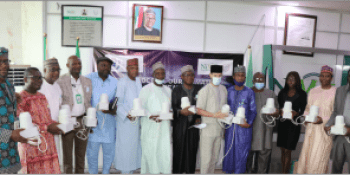“With habitat loss and biodiversity decline, we have lost valuable climate pattern indicators”

“Before, our rainy seasons were longer. We were able to predict weather and seasonal changes by observing animal behavior in their natural habitats,” Paul Thiaw, a local Senegalese farmer, told researchers at a recent workshop on climate services. “With habitat loss and biodiversity decline, we have simply lost some valuable climate pattern indicators,” he stressed while adding, “this is where we can benefit from climate service expertise.”
Farmers are constantly facing new environmental challenges, which are threatening food production in some of the poorest regions of the world. One way to reduce vulnerability is through implementing and working with climate services that are relevant for smallholder farmers.
The CGIAR Research Program on Climate Change, Agriculture and Food Security (CCAFS) is striving for solutions on this, by using multidisciplinary approaches to bridge the gaps between Agro-met experts, geographers, researchers, developers and smallholder farmers.
Therefore, CCAFS convened an international workshop, together with the Climate Services Partnership, USAID and World Meteorological Organisation (WMO), with support from the International Research Institute for Climate and Society (IRI), in Senegal.
Climate services can only resolve a portion of farmers’ problems; however the purpose of the workshop was to foster the work of researchers and multiple stakeholders by identifying the specific needs of farmers to address their largest issues related to climate.
Watch a movie clip showed during the workshop: Voices from the field: Benefit and potentials of Climate Information needs of farmers, and the challenges to meeting those needs. Movie by Francesco Fiondella.
Providing met information in a timely manner is considered as one of the greatest challenges. Yet, many initiatives were reported by participants as endeavored to supply farmers with tailored information about rainfall amounts, distribution and durations of rainy seasons. Smallholder farmers in India for instance, through India’s flagship “Integrated Agromet Advisory Service (IAAS)” program, have indeed benefited from technological interventions through weather advisories, received via mobile phones.
In Mali, Agro-met and Hydro-met informationis disseminated through national radio, TV broadcasting, written press and local radios.
Learn more about the workshop by visiting the site: Scaling Up Climate Services for Farmers in Africa and South Asia.
Another important aspect taken into account during the workshop was the importance of gender in climate information and advisory services. Gender is indeed a crosscutting issue, which plays an important role in how climate services are used and implemented, by men and women:
“Men farmers use met information in the daytime for the field, whereas women farmers constantly use it for livelihood purposes and household responsibilities,” said Aminata Bagayoko, a woman farmer in Cinzana, Mali.
Some of the numerous key recommendations that emanated from the Workshop:
-Need for enhanced capacity to produce tailored climate information and agromet advisory services for farmers i.e. through trainings of met services, extension and intermediaries, model farmers;
- Use of innovative ICTs to reach the great unconnected- eg. Through the use of village public address systems, phone sms, and voice recordings;
- Demonstrated value of the gendered approached, and having gender as a focus from the beginning;
- Simplifying the information to suit farmers’ literacy levels and language barriers.
Read additional stories on how farmers manage risks on our blog.
Arame Tall is a researcher within CCAFS Theme 2: Adaptation through Managing Climate Risks. For more updates on how to manage risks, follow CCAFS on Twitter: @Cgiarclimate.



